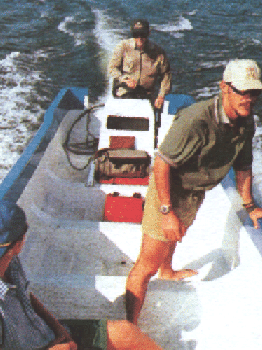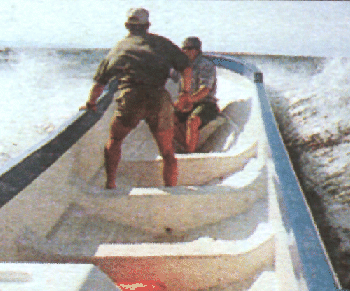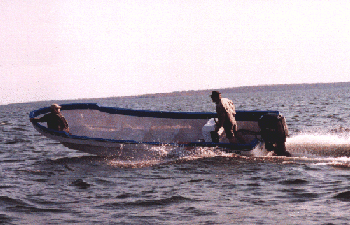FIBRECRAFT/CHASE MARINE
PELICAN
Specifications | Boat report
Specifications
Length
18' 0" or 22'0"(6.7m)
Width
6' 0" (2.16m)
Weight - Boat
450 kg
Recommended Horsepower
40 - 75hp (according to application)
Standard Equipment
-
Hull fitted with transverse bench seats
-
Rear lockable Bench seat (for stowing batteries, tanks etc.
Optional Extras
-
Centre console
-
Flat decked floor
-
Swivel or fixed seats
-
Grab rails
-
Sun canopy
-
Trailer
Boat
Report
(by kind permission of the African
Fisherman August 1999)
The Pelican is one of those watercraft which does not fall into
any particular sport fishing category, but has application within thee
industry. Designed and built as a carrier of bulk weight, and similar in
looks to an enlarged Banana boat, she is used extensively across Africa
and in fact worldwide as a transporter and even for transferring passengers
from A to B, easily handling big waters like Lake Tanganyika. In parts
of the Americas, this design is also used as a fishing skip of sorts.
Our test boat was one of the first to be produced by Fibrecraft,
and was undergoing lake trials. Configured as a cargo carrier, she was
fitted with a 90 hp Mariner.
Construction of the Pelican is basic, emphasising light weight with
great strength. A single skin lay-up of fibreglass is supported and reinforced
by multiple foam encased beams. Due to the very shape of the hull, immense
strength is accomplished with the minimum of reinforced structure. The
hull itself has a deep cutting vee for handling rough water, with full
length lifting strakes, chines and splash deflectors making for a very
low planing speed, and a soft safe ride in rough water.
Although not the type of noat one would tow around much, a basic
trailer can be provided if required.
The specific application of the boat negates the need for elaborate
fittings and finish. The quality of consruction is to the same high standard
as expected from Fibrecraft. Ivor Kesson hopes to develop several variants
to the concept as time and customer feedback dictate, and in fact already
there is an 18 foot version of the Pelican available for production.
 Our test
boat was fitted with a centre console, and Ride guide steering, although
in most applications, the boat is fitted with a tiller control engine (30-60hp)
and little else. Discussing possible applications while using the boat
on Kariba, it is possible to alter the interior with a minimum of hassle,
dropping floor boards in and even seating, turning the craft into an economical
passenger carrying boat for either lake transfers or lake cruises - game
viewing etc.
Our test
boat was fitted with a centre console, and Ride guide steering, although
in most applications, the boat is fitted with a tiller control engine (30-60hp)
and little else. Discussing possible applications while using the boat
on Kariba, it is possible to alter the interior with a minimum of hassle,
dropping floor boards in and even seating, turning the craft into an economical
passenger carrying boat for either lake transfers or lake cruises - game
viewing etc.
We chose Kariba as our test venue to ensure we found some big water,
and this we did. Operating from the Senkwe River fishing lodge, we boated
through the Chete Gorge to be met by some pretty big swells. Having driven
a conventional boat earlier in the day through rough water - cruising just
on the plane to negotiate the rough, short chop, I was immediately impressed
by the Pelicans smooth ride in rough water.  Travelling
relatively light (with only four on board) the hull cut through swells
in excess of two metres with very little pounding or bouncing. Her sher
length (22 feet) makes the relatively short wave pattern encountered on
Kariba, little more than a series of stepping stones as she seems to ride
from crest to crest.
Travelling
relatively light (with only four on board) the hull cut through swells
in excess of two metres with very little pounding or bouncing. Her sher
length (22 feet) makes the relatively short wave pattern encountered on
Kariba, little more than a series of stepping stones as she seems to ride
from crest to crest.
The effiency of the hull meant we could slow the boat right down
if necessary, making the ride even more comfortable whilst providing a
dry ride. The 90 hp proved to be too much power, even once the boat is
fully loaded. Designed for economical sized engines, I would guess she
would be comfortable with as little as 30 hp, although this would ultimately
depend on application and payloads to be carried.
I thoroughly enjoyed driving her over smoother water. At speed, standing
at the rear mounted console, she seemed  to
"fly" over the water, banking into turns much like an aeroplane. When on
the plane, the Pelican is very stable and threw no surprises in steep turns
or other tight manoevres. At rest, the hull has a tendency to heel, this
is due to the narrow beam. With all four peple leaning on one side, she
leaned but did not feel like she would capsize, immediately righting herself
once the weight was centralised.
to
"fly" over the water, banking into turns much like an aeroplane. When on
the plane, the Pelican is very stable and threw no surprises in steep turns
or other tight manoevres. At rest, the hull has a tendency to heel, this
is due to the narrow beam. With all four peple leaning on one side, she
leaned but did not feel like she would capsize, immediately righting herself
once the weight was centralised.
After our departure, Ivor tested the boat more fully laden - carrying
12 people. As would be expected, she handled the weight admirably, performing
much as she did with four people on board. Following these trials, Ivor
believes a load of 20 people would be quite comfortable in the Pelican.
The applications for the Pelican within the commercial sector accross
Africa would be as varied as they are vast. As a general cargo carrier
for camps and lodges on the lake or Zambezi, to game viewing craft within
the swamps, to a pick-up craft catering to the many kapenta rigs.... the
applications are endless. Due to its high gunnel and narrow design, I cannot
see any major use from a sport fishing or recreational perspective in this
country, but I've no doubt that one exists.
Back
to Index
 Our test
boat was fitted with a centre console, and Ride guide steering, although
in most applications, the boat is fitted with a tiller control engine (30-60hp)
and little else. Discussing possible applications while using the boat
on Kariba, it is possible to alter the interior with a minimum of hassle,
dropping floor boards in and even seating, turning the craft into an economical
passenger carrying boat for either lake transfers or lake cruises - game
viewing etc.
Our test
boat was fitted with a centre console, and Ride guide steering, although
in most applications, the boat is fitted with a tiller control engine (30-60hp)
and little else. Discussing possible applications while using the boat
on Kariba, it is possible to alter the interior with a minimum of hassle,
dropping floor boards in and even seating, turning the craft into an economical
passenger carrying boat for either lake transfers or lake cruises - game
viewing etc.

 Travelling
relatively light (with only four on board) the hull cut through swells
in excess of two metres with very little pounding or bouncing. Her sher
length (22 feet) makes the relatively short wave pattern encountered on
Kariba, little more than a series of stepping stones as she seems to ride
from crest to crest.
Travelling
relatively light (with only four on board) the hull cut through swells
in excess of two metres with very little pounding or bouncing. Her sher
length (22 feet) makes the relatively short wave pattern encountered on
Kariba, little more than a series of stepping stones as she seems to ride
from crest to crest.
 to
"fly" over the water, banking into turns much like an aeroplane. When on
the plane, the Pelican is very stable and threw no surprises in steep turns
or other tight manoevres. At rest, the hull has a tendency to heel, this
is due to the narrow beam. With all four peple leaning on one side, she
leaned but did not feel like she would capsize, immediately righting herself
once the weight was centralised.
to
"fly" over the water, banking into turns much like an aeroplane. When on
the plane, the Pelican is very stable and threw no surprises in steep turns
or other tight manoevres. At rest, the hull has a tendency to heel, this
is due to the narrow beam. With all four peple leaning on one side, she
leaned but did not feel like she would capsize, immediately righting herself
once the weight was centralised.